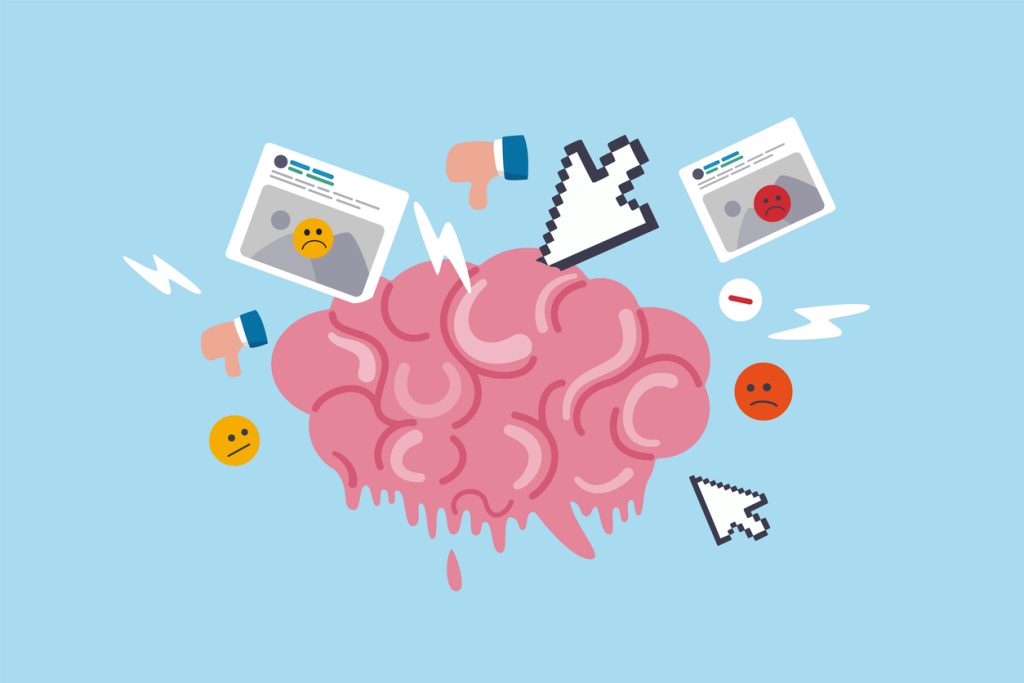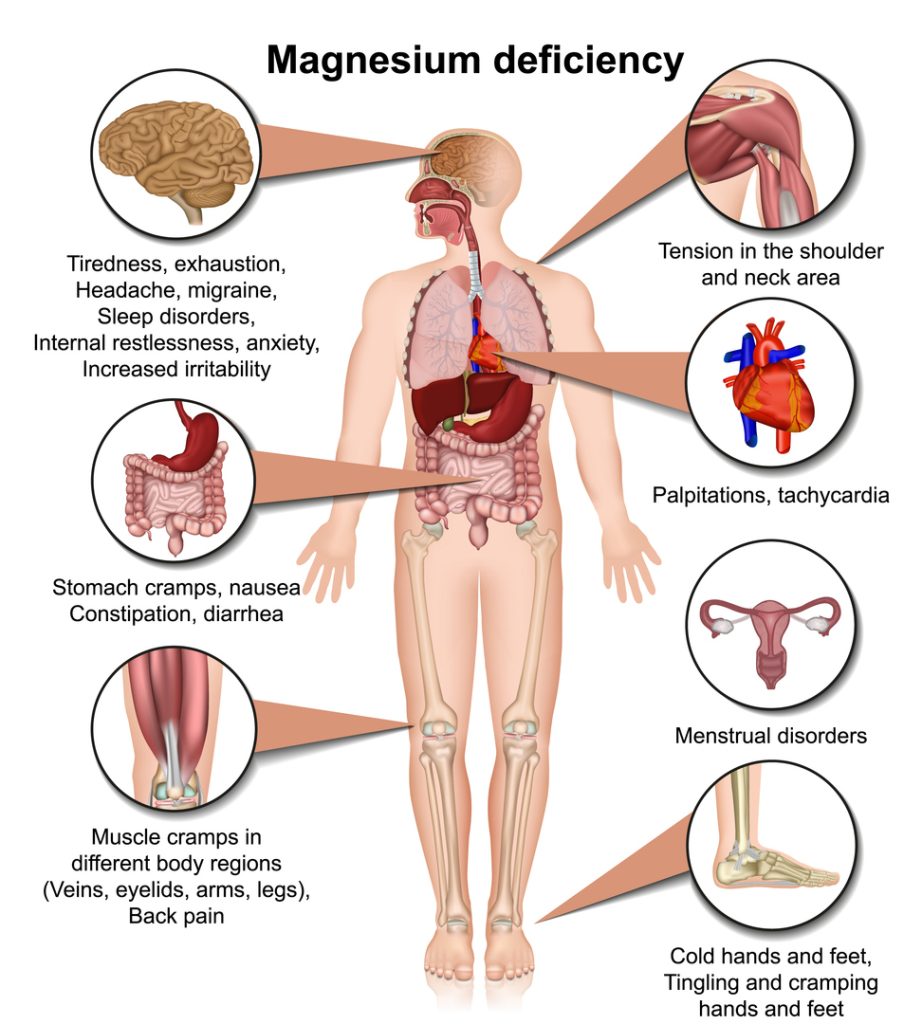Do you ever feel a sense of mental fatigue or “brain bloat” after doom scrolling through social media? Is it hard for you to remember what you are supposed to do because of all the distracting emails, push notifications, texts, and alerts you get during the day? Is your energy feeling sapped by the very tools you need to stay connected, productive, and entertained in our modern world? Surprise! You may have brain rot. Read on to learn why “brain rot” was named Oxford’s Word of 2024, and how magnesium supplements can help you think more clearly.
Brain Rot #1 Oxford’s Word 2024
Brain Rot is defined as the perceived decline in mental health and intellectual capacity due to excessive exposure to trivial or unchallenging content, especially in the digital space [1]. This word has been used critically to describe the negative impact of excessive screen time or passive content consumption. In 2024, the phrase Brain Rot has been named Oxford’s Word of the Year [1], reflecting global concerns about the overconsumption of low-quality online content, particularly on social media. This recognition highlights growing fears that such digital overload may contribute to a decline in cognitive function among internet users worldwide.
For many, the term “brain rot” is used humorously to describe a feeling of mental exhaustion or distracted confusion. However, its implications extend far beyond humor, especially as our dependence on digital platforms for information, entertainment, and social connection continues to grow.

Brain rot can lead to a state of mental fog, sluggishness, reduced attention span, and cognitive decline caused by excessive screen time [2]. Its consequences include difficulty processing information, solving problems, making decisions, and recalling memories. The most effective way to prevent or reduce brain rot is by limiting screen time, removing distracting apps, and disabling unnecessary notifications. However, this can be particularly challenging as many people are deeply immersed in digital technology both personally and professionally.
Regardless of whether reducing screen time is an option or not there are ways to support brain function and mental health while staying digitally connected , how can we support brain function and mental health while staying digitally connected?
The Role of Magnesium in Cognitive Health
Magnesium is an essential mineral that plays a crucial role in numerous bodily functions, including brain health, muscle function, and energy production [3]. It is involved in over 300 enzymatic reactions, helping in reductions of stress and anxiety by modulating the nervous system and promoting relaxation, making it beneficial for mental health and cognitive function. It also aids in improving sleep quality and calming neural activity. Importantly, magnesium supports memory and learning by enhancing synaptic plasticity, which is essential for brain adaptability [4].
Magnesium deficiency has been linked to increased stress and fatigue, poor concentration, and even a higher risk of neurodegenerative diseases [5]. To maintain optimal brain function and mental well-being, incorporating magnesium-rich foods like leafy greens, nuts, seeds, and whole grains or supplementing with bioavailable forms like Magtein (Magnesium L-Threonate) can be highly beneficial.

The Science Behind Magtein
Magtein is redefining brain health with its unique ability to cross the blood-brain barrier and elevate brain magnesium levels. Unlike other magnesium supplements that focus on general wellness, Magtein is specifically designed to support memory, learning, mood, focus and sleep which are key aspects of mental performance and longevity.
With over 15 years of research behind it, Magtein has been clinically shown to improve cognitive function and prevent age-related memory decline. A 2016 study found that taking Magtein reversed cognitive aging by up to nine years, improving focus, attention, and emotional balance [6]. Another 2022 study showed that healthy adults experienced noticeable boosts in memory and learning within just 30 days [7]. Magtein is not just about brainpower, Magtein also enhances sleep quality and daytime productivity for a well-rounded approach to cognitive wellness [8].

The impact of Magtein is not just backed by science, it is reflected in its growing popularity with over 1.1 billion doses sold in 2024 alone, resulting in a 40% growth rate worldwide. It is now widely available in capsules, powders, beverages, gummies, energy bars and functional foods, making it easier than ever to integrate Magnesium L-Threonate into daily routines.
For those concerned about the effects of brain rot, incorporating Magtein into their daily routine could offer a practical way to support brain health while navigating the challenges of a digitally dominated world.
For more details, visit www.magtein.com.
Rafea Naffa, PhD
R&D Director | Cognitive Wellness Advocate
Innovating brain health solutions for the challenges of the digital age.
References:
- https://corp.oup.com/news/brain-rot-named-oxford-word-of-the-year-2024
- https://www.newportinstitute.com/resources/co-occurring-disorders/brain-rot
- Schwalfenberg, G. K., & Genuis, S. J. (2017). The importance of magnesium in clinical healthcare. Scientifica, 2017(1), 4179326.
- Slutsky, Inna, Nashat Abumaria, Long-Jun Wu, Chao Huang, Ling Zhang, Bo Li, Xiang Zhao et al. “Enhancement of learning and memory by elevating brain magnesium.” Neuron 65, no. 2 (2010): 165-177.
- Seelig, M. S. (1994). Consequences of magnesium deficiency on the enhancement of stress reactions; preventive and therapeutic implications (a review). Journal of the American College of Nutrition, 13(5), 429-446.
- Liu, Guosong, Jason G. Weinger, Zhong-Lin Lu, Feng Xue, and Safa Sadeghpour. “Efficacy and safety of MMFS-01, a synapse density enhancer, for treating cognitive impairment in older adults: a randomized, double-blind, placebo-controlled trial.” Journal of Alzheimer’s Disease 49, no. 4 (2016): 971-990.
- Zhang, Chengxiang, Qi Hu, Shifen Li, Feifei Dai, Wen Qian, Susan Hewlings, Ting Yan, and Yubang Wang. “A Magtein®, magnesium L-Threonate,-based formula improves brain cognitive functions in healthy Chinese adults.” Nutrients 14, no. 24 (2022): 5235.
- Hausenblas, Heather A., Tarah Lynch, Stephanie Hooper, Aahana Shrestha, Doug Rosendale, and Jennifer Gu. “Magnesium-L-threonate improves sleep quality and daytime functioning in adults with self-reported sleep problems: A randomized controlled trial.” Sleep Medicine: X 8 (2024): 100121.

